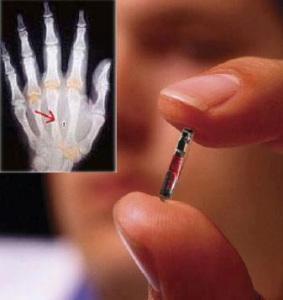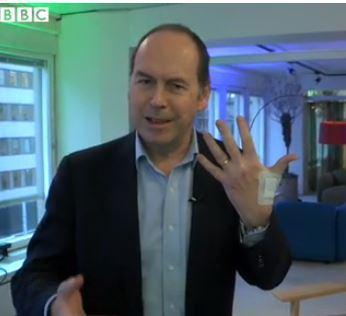“And the third angel followed them, saying with a loud voice, If any man worship the beast and his image, and receive his mark in his forehead, or in his hand . . . he shall be tormented with fire and brimstone in the presence of the holy angels, and in the presence of the Lamb” -Revelation 14:9-10

Rory Cellan-Jones reports for BBC News, Jan. 29, 2015, that an implanted microchip is replacing keys at Epicenter, a new hi-tech office block in Stockholm, Sweden.
Epicenter describes itself as “Innovation with Impact”:
With 4,500 m2 of specially designed office space, we are creating an arena to attract dynamic innovators and entrepreneurs within the digital space. Our vision is to be a magnet for fast growing digital companies and cutting-edge creative corporate initiatives.
The microchip is a tiny RFID (radio-frequency identification) chip, about the size of a grain of rice, implanted under the skin of the hands of the office block’s tenants. Felicio de Costa, whose company is one of the tenants, arrives at the front door and holds his hand against it to gain entry. Inside he does the same thing to get into the office space he rents, and he can also wave his hand to operate the photocopier.
Soon, others among the 700 people expected to occupy the complex will also be offered the chance to be chipped. Along with access to doors and photocopiers, they’re promised further services in the longer run, including the ability to pay in the café with a touch of a hand.
On the day of the building’s official opening, the developer’s chief executive was, himself, chipped live on stage. The whole process is being organised by the Swedish Biohacking Group that recently was profiled by BBC’s Jane Wakefield in “The rise of the Swedish cyborgs.”
Hannes Sjoblad, whose electronic business card is on his own microchip and can be accessed with a swipe of a smartphone, has the title chief disruption officer at the development. Sjoblad said, “We already interact with technology all the time. Today it’s a bit messy – we need pin codes and passwords. Wouldn’t it be easy to just touch with your hand? That’s really intuitive.”
While some of the people around the building were looking forward to being chipped, others were distinctly dubious. One young man said “Absolutely not” to whether he’d sign up to be chipped. An older woman was more positive about the potential of the technology but saw little point in being chipped just to get through a door.
But Hannes Sjoblad says he and the Swedish Biohacking Group have another objective – preparing us all for the day when others want to chip us. “We want to be able to understand this technology before big corporates and big government come to us and say everyone should get chipped – the tax authority chip, the Google or Facebook chip.” Getting the microchip implanted, Sjoblad insists, will enable us to to question the way the technology is implemented from a position of much greater knowledge.
BBC reporter Rory Cellan-Jones offered himself as a guinea pig.
A “rather fearsome looking tattooist” inserted Cellan-Jones’ chip by first, massaging the skin between his thumb and index finger, then rubbing in some disinfectant. Cellan-Jones was told to take a deep breath while the chip was inserted. “There was a moment of pain – not much worse than any injection,” followed by the tattooist sticking a “plaster” (adhesive bandage) over the reporter’s hand.

Rory Cellan-Jones got chipped
Cellan-Jones concludes that “no doubt more sophisticated chips will soon replace wearable technology like fitness bands or payment devices, and we will get used to being augmented. All sorts of things are possible – whether it becomes culturally acceptable to insert technology beneath our skin is another matter.”
See also:
- Getting Us Used to Human Microchipping
- Why I Want a Microchip Implant
- Google wants to implant chips into our brains
- Bill Gates funds contraceptive/abortion microchip that’s remote controlled
- “President Lucifer’s version of ‘No Child Left Behind’,” ( microchipping of Texas school kids)
- FDA just approved pill with computer chip inside
~Éowyn

